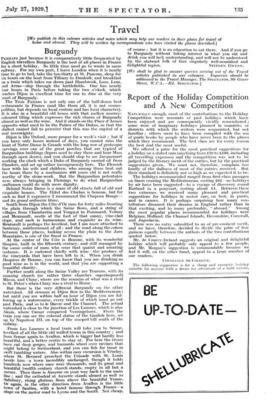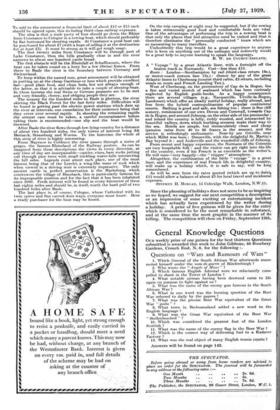Report of the Holiday Competition and A New Competition
NATURALLY enough, most of the contributions to the Holiday Competition were accounts of past holidays which have been enjoyed and are consequently vividly remembered ; some were of imaginary holidays planned in countries or districts with which the writers were acquainted, but not familiar ; others seem to have been compiled with the use of guide books by people who have never been to the places which they recommend. The first class are for every reason the best and the most useful.
We offered a prize for the most practical suggestions for a holiday on a stated sum (anything from £10 to £100, including all travelling expenses) and the competition was not to be judged by the literary merit of the entries, but by the practical suggestions given. We must not, therefore, complain too loudly of the dullness of most of the entries received. But their standard is definitely not so high as we expected it to be.
The holidays recommended ranged from first-class passages on liners cruising the Mediterranean, costing £85—no holidays by air have been suggested—to a voyage of discovery round Rutland in a ponycart, costing about £4. Between these two extremes we received many pleasant and practical suggestions for holidays in motor cars, on foot, in punts, and in canoes. It is perhaps surprising how many con- tributors dreamed their dreams in England rather than in that exciting, and to many preferable, " abroad." Among the most popular places recommended for holidays were Belgium, Holland, the Channel Islands, Devonshire, Cornwall, and Jugoslavia. There was no entry submitted to us of pre-eminent merit, and we have, therefore, decided to divide the prize of five guineas equally between the authors of the two contributions quoted below. Mr. de Courcy-Ireland suggests an original and delightful holiday which will probably only appeal to a few people, and Mr. Morgan's suggestion is commendable because we feel it will, on the other hand, appeal to a large number of our readers.
CONSTANCE TO COLOGNE.
The following suggestion is for a cheap and energetic holiday suitable for anyone with a desire for adventure of a mild nature. To add to the amusement a financial limit of about £12 or £15 each should be agreed upon, this including third-class railway expenses. The idea is that a male party of four should go down the Rhine from Constance to Cologne in a rowing boat, which should preferably be flat-bottomed 'for shooting rapids. At Constance a good boat can be purchased for about £7 (with a hope of selling it at the destination for at least £3). It must he strong as it will get rough usage. The first twenty miles from Constance will be through part of. Lake Constance, then the hills gradually close in and the river narrows to about one hundred yards broad.
The first obstacle will be the Rheinfall at Schaffhausen, where the boat can be taken round on a lorry for a few (Swiss) francs. From there to Basle the river is the boundary between Germany and Sivitzerland. -
To keep within the named sum, great amusement will be obtained in• putting up at the cheap Gasthaus or inns which provide excellenii
fare—good plain food, and clean beds, but not always eno of the latter, so that it is advisable to take a couple of sleeping- In these taverns the real Swiss or German peasants are to be met and very friendly, cheery, and obliging people they are. The scenery for the hundred miles to Basle is glorious, the river skirting the Black Forest for the last forty miles. Difficulties will be found in getting past the electric power stations which dam up the river at intervals, one consolation for their existence being that they cover over several rapids. In shooting the remaining rapids the utmost care must be taken, a careful reconnaissance before taking them is recommended-Lone slip and the boat would be firewood.
After Basle the river flows through low-lying country for a distance of about two hundred miles. the only towns of interest being Alt Breisack, Strassburg and Worms. To the historian the whole of this strip of river is highly interesting.
From Mayence to Coblencz the river passes through a series of gorges, the famous Rhineland of the Railway posters. As can be imagined from these descriptions the views in every direction, at any time of day are insurpassable—castles, vines, bare rocks jutting out through pine trees with small trickling water-falls intersecting the hill sides. Legends exist about each place, one of the most' fainous being that of the Lorelei, a wing-like mass of rock which when viewed-in a driving mist is extremely impressive. The only ancient castle in perfect preservation is the Marksburg, which overtowers the village of Brauback, this is particularly famous for _ its impregnable position and for the fact that it has been inhabited since 1060. Fresh interest will be found in every kilometre'of these . last eighty miles and should be, in itself, worth the hard pull of two himdred miles after Basle.
The last place is, of course, Cologne, whose Cathedral with its twin spires and fine carved door-ways, everyone must know: Here a ready purchaser for the boat may be found.
On the trip camping at night may be suggested, but if the rowing is taken strenuously good food and comfortable beds are vital. One of. the advantages of performing the trip in a rowing boat is that only the places that feel attractive need be visited and that it therefore eliminates the "-personally conducted " tours which are so nauseating to many travellers.
Undoubtedly this trip would be a great experience to anyone who is keen on anything out of the ordinary and indirectly would be a great help to anyone learning to speak the language. B. W. DE COI:TROY-IRELAND.
A " Voyage " by a great Atlantic liner, with a fortnight off the
• beaten track in Normandy. Cost—less than £15.
Route : London—Southampton by rail (third-class return 19s.), or motor-coach (return fare 12s.) : thence by any of the great Atlantic liners to Cherbourg (tourist third cabin, £3 return, including meals en route and French Landing Tax.). West of Cherbourg, on the promontory of Cap de la Hogue, lies a fine and varied stretch of seaboard which has been curiously neglected by _ English guide-books. As a happy consequence there are several villages (e.g., Nacqueville, Urville-la-Hogue, Landemer) which offer an ideally restful holiday, really abroad, and free from the hybrid cosmopolitanism of popular continental resorts. Bathing is good and safe, sea fishing too ; there is fine cliff scenery, reminiscent of our own Devon and Cornwall, towards Cap de la Hogue, and around Jobourg, on the other side of the peninsular ; and inland the country is hilly, richly wooded, and intersected by beautiful valleys, down which burbling streams make their way to the sea. Hotels are simple, but immaculately clean and cheap (pension rates from 40 to 00 francs in the season), and the service is refreshingly enthusiastic. Near-by are Greville, near which Millet was born : Omonville, with the delightful St. Martin's Bay beyond it : and Auderville and the Wonderful cliffs Of Jcibourg. From recent and haPpy experience, the Normaes of the Cotentin are very hospitable folk : and the visitor can get right into the life of the country, even if his French is as execrable as the writer's.
He will miss—very happily—the " tripper " atmosphere. --
Altogether, the combination of the little " voyage " in a great liner, and the experience of real French-life in delightful:cotmtry, will make up a holiday which, it is -safe to say, will be long remembered.
As will be seen from the rates quoted (which are up to date); £15 would allow a balance of about £5 for local travel and incidental expenses.
STEPHEN H. MORGAN, 15 Coleridge Walk, London, N.W,11.
Since the planning of holidays does not seem to be as inspiring as we hoped, we suggest for our next competition a description or an impression of some exciting or entertaining incident which has actually been experienced by the writer during a holiday. A prize of five guineas will be given for the entry which is considered to be the most remarkable in substance, and at the same time the most graphic' in the manner of its telling. The competition will close on Friday, September 13th.



































 Previous page
Previous page